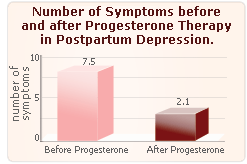Postpartum depression is a severe psychological condition that occurs in women after giving birth. According to a recent study published in the British Medical Journal, low levels of the hormone progesterone may be to blame.
Progesterone hormone levels oscillate radically during and after pregnancy, which has led some doctors to believe that this may be an essential part of the acute depression reported by many women after pregnancy. As many as thirty percent of women suffer from the so-called “maternity blues” in the days following pregnancy.

The “maternity blues” are a group of symptoms suffered in the week (or longer) following delivery, including intense sadness, insomnia, difficulty concentrating, irritability, headaches, and bouts of tears. Women usually report the most intense symptoms four to five days after giving birth, which is when hormonal fluctuations are at their most severe. These feelings may develop into more intense and longer-lasting postpartum depression.
A trial led by Harris et al. observed 156 women experiencing their first pregnancy. The authors measured the women's progesterone levels at various points during the pregnancy and after birth, and evaluated their emotions based on “the Edinburgh postnatal depression scale, the Stein scale for maternity blues, and the Beck depression rating inventory.”
Progesterone levels were measured in the patients by collecting saliva samples daily in the weeks before delivery, and for the following 40 days. The women were also asked to complete a daily questionnaire to gauge mood after birth for 10 days, and after 40 days they were seen by a psychiatrist to assess depression. Blood samples were also drawn at four separate points during the trial.
In all women, progesterone production builds slowly during pregnancy, when it is chiefly produced by the placenta. By the time of birth, progesterone levels are several hundred times above normal. After birth and the shedding of the placenta, progesterone levels drop abruptly and severely.
Most of the subjects participating in the trial observed at least some of the symptoms of the maternity blues in the week following giving birth. However, the report determined that the women most likely to undergo from the maternal blues were those with the most acute swings in progesterone levels, e.g., the highest levels of progesterone during pregnancy, the steepest drop in levels after birth, and continued lower progesterone levels postpartum.
The results of this study have led some to believe that progesterone therapy may be a viable option for the treatment of postpartum depression.